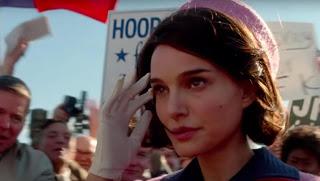 Pablo Larrain's Jackie (2016) is one of those prestige dramas so caught up in being an actor's showcase that it forgets to work on any other level. Natalie Portman gives a game impression of Jacqueline Kennedy, but the movie suffocates under its own overachieving emptiness.
Pablo Larrain's Jackie (2016) is one of those prestige dramas so caught up in being an actor's showcase that it forgets to work on any other level. Natalie Portman gives a game impression of Jacqueline Kennedy, but the movie suffocates under its own overachieving emptiness.Shortly after President John F. Kennedy's assassination, Jackie Kennedy (Natalie Portman) invites a journalist (Billy Crudup) for an adoring profile. Jackie offers memories of life as First Lady and her husband's life, along with her perspective on events in Dallas. It's soon clear that she is shaping her husband's image as much as providing a truthful recollection of events; she's reluctant to show the President's flaws, or her own weaknesses and foibles.
Handled more gracefully, Jackie could have made an excellent drama. Larrain and screenwriter Noah Oppenheim chart Jackie Kennedy as endlessly image-conscious: from her White House broadcasts and work as America's First Lady and world's fashion plate to her role as grieving widow, she deliberately projects a confident, poised woman hiding her weaknesses, faults and fears. Terrified of her future, she seeks to craft her husband into an American hero, feeding the journalist. It's an intriguing mediation on
Yet Larrain drowns Jackie in overbearing, often inappropriate auteur flourishes. Flashbacks play out in fragments sprinkled throughout the narrative, to no discernible purpose. Seeing Jackie's televised White House tour in ninety-second drabbles doesn't make any discernible point, since they don't build anywhere or make a point that's not obvious after the first snippet. Scenes like Jackie listening to the Camelot score while pondering her husband's legacy are as subtle as a cattle prod, not helped by the elliptical editing or Mica Levi's sledgehammer string score. The movie wants to pound us into emotional submission as it's being ponderous and deep, and the mix doesn't work.
Nor does Jackie sell its drama. Larrain tantalizes us with snippets of Jackie's friendship with Bobby Kennedy (Peter Sarsgaard, badly miscast) or the latter's tension with Lyndon Johnson (John Carroll Lynch, even more miscast), but these scenes clunk badly: they're too thin to be dramatic and ring laughably false. Having RFK muse about Vietnam's failure in November 1963 evinces the post facto portentousness of lazy historical fiction. More importantly, we never get a window into the real Jackie, any idea that she's something more than a grieving widow with media savvy. The movie never seems human, a fatal flaw in a biopic.
One's initially hesitant to accept Natalie Portman as Jackie, her appearance and hesitant accent seeming too mannered and impressionistic. Eventually, Portman digs into the role's humanity, finding reserves of haughtiness and dignity to enhance her sorrow, confusion and hurt. Even so, our initial reticence never fades: for all Portman's craft and skill, her Jackie never quite transcends impersonation. Since the supporting cast are overwhelmingly ciphers (only John Hurt's crusty priest makes an impression), Portman's adequate work offers only marginal redemption.
I like Natalie Portman as much as anyone; she's a charming, intelligent woman and a beautiful, engaging actress. But she desperately needs a better nose for projects; however tantalizing playing a beloved First Lady seems it's nothing without an adequate script, appropriate direction or a general sense of what it's about.

